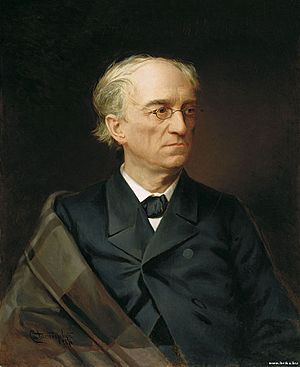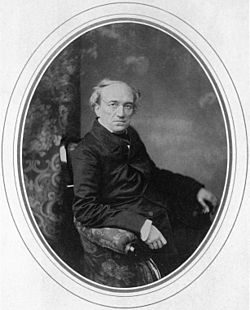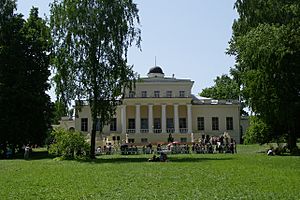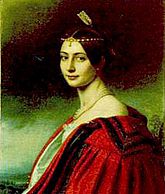Fyodor Tyutchev facts for kids
Quick facts for kids
Fyodor Tyutchev
|
|
|---|---|

Tyutchev as painted by Stepan Alexandrovsky
|
|
| Born | December 5 [O.S. November 23] 1803 Ovstug near Bryansk, Oryol Governorate, Russian Empire |
| Died | July 27 [O.S. July 15] 1873 (aged 69) Saint Petersburg, Russian Empire |
| Spouse | Eleonore Peterson (1826–1838) Ernestine von Dörnberg |
Fyodor Ivanovich Tyutchev (Russian: Фёдор Ива́нович Тю́тчев; December 5, 1803 – July 27, 1873) was a famous Russian poet and diplomat. He is known for his deep and thoughtful poems about nature, love, and life.
Contents
Early Life and Education
Tyutchev was born into a noble Russian family. His family lived on their estate called Ovstug, near Bryansk, in what is now Russia. His father, Ivan Nikolaevich Tyutchev, worked for the government. He helped manage building projects in Moscow. Fyodor's aunt, Yevdokia Meshcherskaya, was a nun who founded a monastery.
The Tyutchev family had a long history. Their ancestors were mentioned in an old story from the 1400s. This story, called The Tale of the Rout of Mamai, described one of their family members as a trusted diplomat. Fyodor's mother, Ekaterina Lvovna Tolstaya, came from the famous Tolstoy family.
Fyodor spent most of his childhood in Moscow. When he was 13, he joined a writing group led by Professor Merzlyakov. At just 15, his first work was published. It was a translation of a poem by the ancient Roman poet Horace. Even at a young age, his poems had a special, grand style.
His first poetry teacher was Semyon Raich, a poet and translator. From 1819 to 1821, Tyutchev studied at Moscow State University. He focused on languages and literature.
Diplomatic Career and Life Abroad
After finishing university, Tyutchev joined the Foreign Office. This was like the government department for dealing with other countries. In 1822, he became a trainee diplomat in Munich, Germany. He stayed abroad for 22 years, working in different countries.
In Munich, he met and fell in love with Amalie von Lerchenfeld. She was the half-sister of a young Bavarian diplomat. Tyutchev wrote several poems inspired by her. Even after Amalie married someone else, they remained friends. They often met in diplomatic social events.
While living in Munich, Tyutchev was influenced by German Romanticism. This was a popular art and literature movement. He met famous people like the poet Heinrich Heine and the philosopher Friedrich Schelling.
In 1826, Tyutchev married Eleonore Peterson. She was a German widow. They had a daughter named Anna Tiuttjev. After Eleonore passed away in 1838, Tyutchev married Ernestine von Dörnberg. She was also a German widow. Neither of his wives spoke Russian well at first. Tyutchev himself often spoke French, and most of his personal letters were in French.
In 1836, some of Tyutchev's poems were published in a literary magazine called Sovremennik. The famous poet Alexander Pushkin liked them. However, the public did not show much interest.
Eleonore's death in 1838 deeply affected Tyutchev. He wrote very few poems for the next ten years. Instead, he focused on writing political articles. These articles shared his strong ideas about Russia's role in the world.
In 1837, Tyutchev moved to the Russian office in Turin, Italy. He did not like living there. After marrying Ernestine, he left his job without official permission to get married in Switzerland. Because of this, he was dismissed from the Foreign Service. He lived in Germany for five more years without a job.
Return to Russia and Later Life
Tyutchev returned to Saint Petersburg in Russia in 1844. He became very popular in high society. His daughter, Kitty, was also well-liked. The famous writer Leo Tolstoy even considered marrying her. Kitty later became an important person at the Russian court.
Soon after returning, Tyutchev got a new government job as a censor. This meant he reviewed books and articles before they were published. He eventually became the head of the Foreign Censorship Committee.
Tyutchev loved to travel. He often took diplomatic trips, which allowed him to see new places. He visited many parts of Europe, including Italy, France, Germany, Austria, and Switzerland. He especially loved the Swiss lakes and mountains. Many of his best poems were inspired by these journeys.
During his lifetime, Tyutchev was not widely known as a poet. He wrote about 400 short poems in Russian. He did not think his poems were very important and often did not bother to write them down. If he did, he sometimes lost the papers. It was not until 1854 that his first book of poems was printed. This book was put together by other writers, like Ivan Turgenev, without Tyutchev's help.
In 1850, Tyutchev began a relationship with Elena Denisyeva. She was more than twenty years younger than him. They had three children together. This relationship inspired some of his most beautiful love poems. These poems are known as the "Denisyeva Cycle." They show deep feelings of sadness and love.
In the early 1870s, Tyutchev faced great sadness. His brother, son, and daughter all passed away. This made him very depressed. He had suffered from depression at different times throughout his life. After several strokes, he died in Tsarskoye Selo in 1873. He was buried in Novodevichy Monastery in St. Petersburg.
Political Ideas
Tyutchev was a strong supporter of Pan-Slavism. This was an idea that all Slavic peoples (like Russians, Poles, Serbs) should be united. He often criticized Western countries, the Vatican, and the Ottoman Empire. He also had strong opinions about Poland.
When it came to Russia's own government, he had generally open-minded views. He liked most of the changes made by Tsar Alexander II. He especially supported the end of serfdom in 1861. As a censor and a writer, he believed in freedom of speech. This sometimes caused trouble with his bosses.
His many poems about political topics are not as well-remembered today.
Tyutchev's Poetry Style
Tyutchev is one of the most famous Russian poets. Many people memorize and quote his lines. About half of his poems are occasional pieces, translations, or political poems.
The other 200 or so poems show his true poetic talent. Whether he described nature or love, his poems often explored deep philosophical ideas. Tyutchev's world often had two opposing parts. He used ideas like night and day, north and south, dreams and reality, or order and chaos. Each of these ideas had a special meaning. For example, "night" in his poems often represented the vastness of time and space. In the confusing world of "night" or "winter," people feel alone. This gives his poetry a modern feeling of worry. Because of this, he was rediscovered and praised by later Russian poets in the late 1800s and early 1900s.
A Sample of His Verse
Silentium! is a very famous poem by Tyutchev. He wrote it in 1830. It is special because its rhythm makes it easier to read silently than aloud. Like many of his poems, it gives human qualities to nature. It also shows a belief that God is in everything. One critic said that in his poems, "the past and present of human life mix together."

- Speak not, lie hidden, and conceal
- the way you dream, the things you feel.
- Deep in your spirit let them rise
- akin to stars in crystal skies
- that set before the night is blurred:
- delight in them and speak no word.
- How can a heart expression find?
- How should another know your mind?
- Will he discern what quickens you?
- A thought, once uttered, is untrue.
- Dimmed is the fountainhead when stirred:
- drink at the source and speak no word.
- Live in your inner self alone
- within your soul a world has grown,
- the magic of veiled thoughts that might
- be blinded by the outer light,
- drowned in the noise of day, unheard...
- take in their song and speak no word.
-
-
-
-
-
-
-
-
-
- (translation by Vladimir Nabokov)
-
-
-
-
-
-
-
-
-
This poem inspired the composer Georgi Catoire to write a song called Silentium. Another of Tyutchev's poems, "O chem ty voesh' vetr nochnoy...", inspired Nikolai Medtner's piano sonata Night Wind. Rakhmaninov also set Tyutchev's poem Spring Waters to music. The composer Boris Tchaikovsky used "Silentium" in his 1974 cantata. Lyubov Streicher also set Tyutchev’s words to music. The Ukrainian composer Valentyn Sylvestrov created a memorable setting of 'Last Love'.
Tyutchev's poems have also appeared in films and music. At the end of Andrey Tarkovsky's film Stalker, a character recites a Tyutchev poem. In 2007, the Icelandic musician Björk used the poem "The Dull Flame Of Desire" for a song on her album Volta.
See also
 In Spanish: Fiódor Tiútchev para niños
In Spanish: Fiódor Tiútchev para niños
- Afanasy Fet
- List of 19th-century Russian Slavophiles
 | Isaac Myers |
 | D. Hamilton Jackson |
 | A. Philip Randolph |



